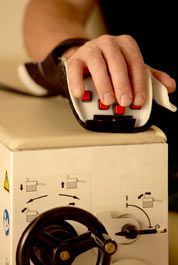

Scientific Lectures //
Cognition and Cholinergic Function after Traumatic Brain Injury: Lessons in TBI Translational Neuroscience
David Arciniegas, MD, FANPA, FACLP, Director of Education, Marcus Institute for Brain Health, Clinical Professor of Neurology & Psychiatry, University of Colorado School of Medicine, Physician Research Scientist, Craig Hospital
Presented: July 12, 2019
ABSTRACT: Cognitive deficits are common chronic and functionally important consequences of traumatic brain injury (TBI). Developing rational and effective pharmacotherapies for posttraumatic cognitive impairments requires a more coherent account of their neuroanatomic and neurochemical bases. One such account is the cholinergic hypothesis of posttraumatic cognitive impairments. This hypothesis asserts that normal structure and function of the cerebral cholinergic system is necessary for normal human cognition; basic and clinical studies acute and chronic neurotrauma-induced demonstrate alterations in the structure and function of cerebral cholinergic systems; and that acute and chronic cognitive impairments are associated with these alterations in cerebral cholinergic structure and function. The hypothesis further suggests that augmentation of cerebral cholinergic function will improve subacute and chronic cognitive impairments. This lecture provides a review of the cholinergic hypothesis of posttraumatic cognitive impairments and the evidence supporting it. A brief introduction to the structural and functional anatomy of cerebral cholinergic systems is provided and is coupled to a review of findings from the experimental injury and human injury literature demonstrating the cognitive consequences of neurotrauma-induced dysfunction of cerebral cholinergic systems. Thereafter, findings from clinical trials of acetylcholinesterase inhibitors for posttraumatic cognitive impairments are offered, including preliminary findings from a federally-sponsored multicenter randomized controlled trial led by the presenter. The clinical implications of this hypothesis and the evidence supporting it will be discussed.
BIO: Dr. Arciniegas is Director of Education for the Marcus Institute for Brain Health and Clinical Professor of Neurology and Psychiatry at the University of Colorado School of Medicine in Aurora, Colorado and serves concurrently as Physician Research Scientist at Craig Hospital in Englewood, Colorado. Over the last 20 years, his clinical work and patient-oriented research have focused on the cognitive and non-cognitive neuropsychiatric sequelae of traumatic brain injury (TBI) and other neurodevelopmental, acquired neurological, and neurodegenerative disorders. He has been continuously funded since 1996 as a clinical investigator on more than 35 extramurally supported research projects, including 18 federally-funded grants. He has authored 125 articles in peer-reviewed scientific journals and more than 40 book chapters. He has edited seven medical textbooks, including the American Psychiatric Association’s Textbook of Traumatic Brain Injury, Third Edition (2019) and Textbook of Neuropsychiatry and Clinical Neurosciences, Sixth Edition (2018). He is Editor of the Journal of Neuropsychiatry and Clinical Neurosciences, Associate Editor of the Journal of Head Trauma Rehabilitation, and is a member of multiple journal editorial boards and national scientific grant review committees. He has delivered more than 275 scientific lectures in the United States and abroad, including a dozen named lectureships and keynote addresses, to audiences on a broad range of topics in neuropsychiatry and neurorehabilitation. In addition to multiple institutional awards for teaching and research excellence, he received the 2000 Young Investigator Award from the Brain Injury Association of America; the 2005 Outstanding Contribution Award from the Brain Injury Association of Colorado; the 2015 Mitch Rosenthal Award for Scientific and Clinical Achievement in Brain Injury Rehabilitation from Virginia Commonwealth University and Brain Injury Services, Inc; and the 2016 Innovative Clinical Treatment Award from the North American Brain Injury Society. Dr. Arciniegas also serves as Chairman and CEO of the International Brain Injury Association, is President-Elect of the International Neuropsychiatric Association, and contributes his efforts to governmental and non-governmental organizations striving to improve the lives of persons and families affected by brain injuries.

